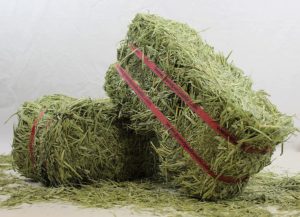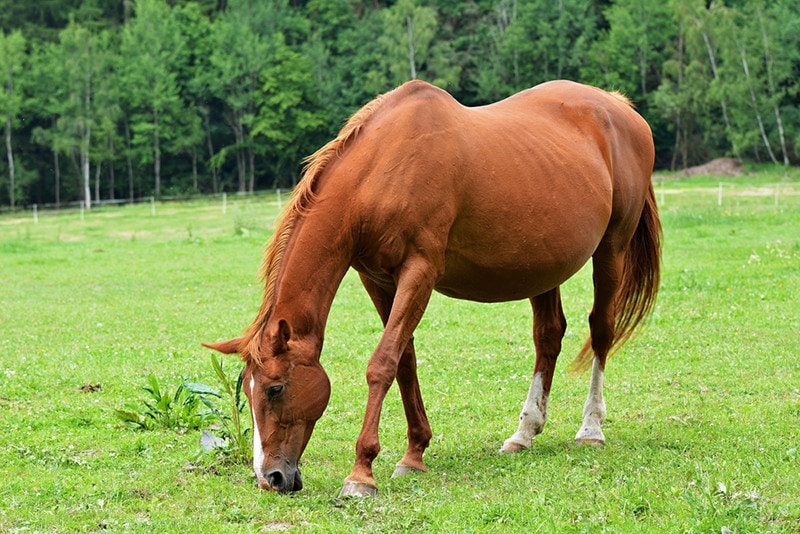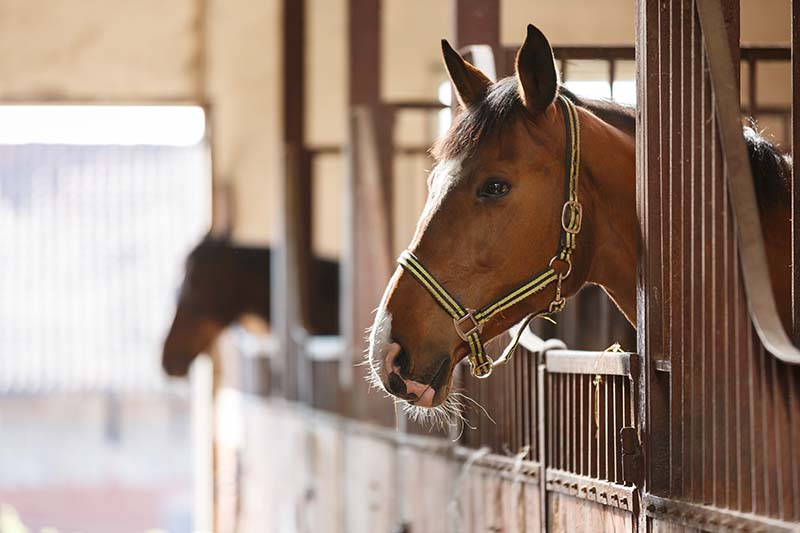About 75% of a horse’s diet should be made up of hay, so it’s important that the hay that you offer your horse is fresh and has everything that they require for peak health. Grain should only be supplemental; most of the nutrients that your horse consumes will come from hay and forage.
There are many different types of hay, such as Bermuda, alfalfa, and timothy. You can get hay in bales, bags, or even pellets, which are perfect for aging horses that have a hard time chewing their standard forage.
With so many options, it can be difficult to decide on the perfect hay for your horse, especially if you’re new to the equine world. Here, we hope to simplify things with reviews of the best hays for horses, so you can decide which one is the most suitable.
A Quick Glance at the Winners of 2024
| Image | Product | Details | ||
|---|---|---|---|---|
| Best Overall |

|
Ametza Premium Compressed Bermuda Hay |
|
Check Price |
| Best Value |

|
Ametza Alfalfa Bermuda Blend Hay Replacer Pellets |
|
Check Price |
| Premium Choice |

|
Crypto Aero Wild Forage |
|
Check Price |

|
Grandpa’s Best Orchard Grass Bale |
|
Check Price | |

|
Grandpa's Best Timothy Hay |
|
Check Price |
The 5 Best Hay for Horses
1. Ametza Premium Compressed Bermuda Hay — Best Overall
Bright green and crisp, the Ametza Premium Compressed Bermuda Hay is our top choice for horses. You can see and smell the quality as soon as you open the bag that each bale is housed in. Since it’s compressed, the bag holding a 50-pound bale is smaller than you might expect. Oh, and did we mention that the bag is reusable? How’s that for eco-friendly!
This bale is comprised entirely of Bermuda hay, which is more digestible than alfalfa hay, and part of the reason that it’s at the top of our list. Bermuda hay is a great source of both calcium and vitamin A, and you’ll find no blister beetles anywhere in these bales.
With 39% crude fiber and 8% protein, this hay provides exactly the nutrients your horse needs. It’s all-natural and free of preservatives or fillers. However, out of several bales, we did get one that wasn’t quite as fresh as the others. It had turned a bit brown and didn’t smell fresh, though we think it was more of a fluke than a regular occurrence.
2. Ametza Alfalfa Bermuda Blend Hay Replacer Pellets — Best Value
With the Ametza Alfalfa Bermuda Blend Hay Replacer Pellets, you’ll be giving your horse more than just a single type of hay. Instead, this is a blend of both Alfalfa and Bermuda hays, offering your horse added nutrition and flavor. Plus, it’s reasonably priced for the large 50-pound volume, which is why we think it’s possible the best hay for horses for the money.
Hay can be messy and dusty, breaking apart and becoming difficult to feed. However, this blend comes in pellet form, making it easy to offer to your horse and just as easy for them to eat. Even aging horses that have a hard time foraging will do well with this blend as you can soak the pellets in water to soften them for horses with dental problems.
Overall, we really like this affordable hay pellet blend. But it’s not perfect. On the ingredients list, we weren’t thrilled to see corn distillers dried grains; a cheap filler and not the best for horses, but it also helps to keep the cost low.
3. Crypto Aero Wild Forage — Premium Choice
It’s pretty pricey compared to other forage options for your horse, but the Crypto Aero Wild Forage offers excellent equine nutrition that we recommend for just about any horse. It’s far more than just hay, though there are several types of hay included, such as Timothy and Alfalfa. Offering vast nutritional benefits beyond just hay, you’ll also find rose hips, papaya, peas, spirulina, and green cabbage in this blend.
Despite the inclusion of several health-boosting vegetables and fruits, the ingredients list for this forage mix is quite short, so you know it’s not loaded with fillers and cheap by-products. Instead, every ingredient has a point, adding to the diverse assortment of vitamins and minerals found in this forage formula.
With just 6.5% non-structured carbohydrates, this forage is safe for any horse, even those with metabolic conditions. It also contains 33% fiber, optimized to aid your horse’s digestive health. To that end, you’ll also find fenugreek and organic yeast, plus L-glutamine from green cabbage that can help to build and repair the intestinal lining.
4. Grandpa’s Best Orchard Grass Bale
Grandpa’s Best Orchard Grass Bale has some great properties for horses, but this isn’t the feed we’d choose for our equine friends. It is quite high in fiber at 32%, which will help keep your horse’s digestive system functioning properly. Furthermore, this hay is free of preservatives, so it’s healthy and natural for your horse.
Orchard grass is a sweet grass, and in our experience, horses love the taste. However, it’s also pretty expensive. This is made even worse by the fact that Grandpa’s Best Orchard Grass only comes in small bales. If it came in larger bales, it might be a better choice for horses who have to eat considerable amounts each day.
While we have no major concerns with this hay overall, we weren’t thrilled with the weight that arrived. After weighing it, we realized that the bale we were sent was noticeably lighter than it should have been, robbing us of hay we paid for. Considering the already pricey nature of this hay, we think it’s best to skip it in favor of something available in bulk that actually provides the amount of feed you’re paying for.
5. Grandpa’s Best Timothy Hay
Of all the hays you could offer your horse, Timothy hay is the easiest to digest, making it perfect for horses with stomach or digestive problems. This hay is completely natural and preservative-free. As such, it’s nutritious and safe for horses. Additionally, this hay promotes a shiny coat and healthy weight, keeping your horse looking and feeling its best.
Despite the few positives associated with Grandpa’s Best Timothy Hay, it’s far from our favorite. We found that the freshness was hit or miss at best. Some bales were green and relatively fresh, while others were brown and had signs of mold. This hay was also extremely dusty compared to other hays we tested.
The biggest problem with using this hay to feed horses is the small quantity it comes in. You can only get this hay in mini bales, making it a poor choice for horses that will consume an entire bale each day. Plus, the pricing is prohibitively expensive. While it may be great hay for small animals, Grandpa’s Best Timothy Hay isn’t an option we’d pick for horses unless there were no alternatives available.
- You may also like: How Much & How Often Should Horses Eat? (With Feeding Chart)
 Buyer’s Guide: Buying the Best Hay for Horses
Buyer’s Guide: Buying the Best Hay for Horses
Feeding forage to your horse can be ultra-simple or entirely too complicated. You can simply let your horse graze in the pasture to consume all the forage that they need. However, this requires ample grazing space and the right types of grass in your grazing area. That’s why most horses rely on baled hay for the majority of their feeding. Fortunately, this means you have many options, as there’s more than one form of hay.
That said, one of the most confusing aspects of choosing hay for your horse is determining how to compare each of the different feeds. What should you be looking for and how do you tell apart different products? Let’s go over the most important differences so you can make a more educated decision regarding your horse’s nutrition.
Types of Hay
Each type of hay offers different nutrition for your horse. Granted, your horse can be happy and healthy eating any of these hays, though some provide more calories, fiber, protein, etc. than others.
Alfalfa
Hay comes in two main forms. Some hays are in the legume family, while others are grasses. Alfalfa is one of the most common legume hays. As such, it has a much higher protein content than many other types of hays, ranging from 15% to 21%, depending on when it was cut. For comparison, most grass hays are 10% or less protein. Also, alfalfa hay provides more calories per pound, so your horse won’t need to eat as much. However, if your horse consumes large amounts of alfalfa hay, it could lead to weight gain.
Alfalfa hay is readily available in most places. In fact, it’s the only forage sold in every U.S. state. Horses tend to love alfalfa because it’s one of the sweeter hays. It also has more calcium than other hays, so it’s a great choice for most horses.
Timothy
While less nutritious than alfalfa hay, timothy hay offers more nutrients compared to other grass hays. It’s also easier to digest, consisting of 30% crude fiber, making it ideal for horses with sensitive digestion. That said, timothy hay tends to be one of the more expensive options, so it’s not always price effective.
Bermuda
Bermuda grass is one of the more affordable hay options for your horse. On the downside, Bermuda grass of lower quality could cause impaction in horses. This type of hay is higher in calcium than timothy hay, though it contains less fiber. Otherwise, it offers similar nutrition.
Orchard Grass
The nutrient profile of most hay varies greatly depending on when it was harvested. Orchard grass tends to be less affected by harvest time and is therefore more affordable in most cases. It has more phosphorous than either Bermuda or timothy hay and offers 30% fiber for smooth digestion.

Bale Size
An average horse that weighs about 1,000 pounds will consume 15–20 pounds of hay each day. With large bales weighing around 50 pounds, you can easily expect to go through two or more bales each week. But if you purchase small bales, you could be going through a bale each day. Bales of 20 pounds or less will disappear in a single day’s feeding with just one horse. So, double-check before clicking purchase that the hay that you’re choosing comes in bales that are appropriately sized for equestrian use.
Freshness
Hay is a plant that must be harvested. As such, it’s subject to the same issues as other plants that must be harvested, stored, and transported. For example, it can grow mold or fungus, turn brown, and become brittle, dry, and dusty. When it’s not fresh, hay can become a health concern for your horses. While it’s hard to ensure that your hay comes fresh, you must do your best to find a brand of hay that always arrives in great condition so it’s safe for your horse.
Price
We don’t generally recommend price shopping for your horse’s feed, but some feeds are overpriced compared to others. Once you find several hays that you’re happy with, compare their pricing, and make sure none of them are vastly over- or underpriced. For the most part, whenever hay is too cheap or too expensive, there’s an underlying reason that should be investigated. You don’t want to purchase affordable hay just to find out that it comes in tiny bales or never arrives fresh.
Conclusion
Hay is the main food that horses eat, and about ¾ of their diet should consist of hay and forage. Naturally, that’s quite a large amount of food for an animal that weighs 1,000 pounds or more. In fact, the average horse will consume 15–20 pounds of hay each day! So, it pays to pick the right hay product and ensure that your horse is getting all the nutrition that they need from the hay that you offer.
Our top choice for most horses is the Premium Compressed Bermuda Hay Bale Horse Forage from Ametza. It’s an all-natural feed made entirely of compressed Bermuda hay, which is more easily digestible than alfalfa and offers plenty of calcium and vitamin A. It’s completely free of blister beetles and even comes in a reusable bag.
We think the best value is to be found in the Ametza Alfalfa-Bermuda Blend Hay Replacer Pellets. They’re priced reasonably and offer a convenient, easy-to-feed forage replacement for any horse. They can even be soaked to make the pellets easy to eat for senior horses, and the blend in these pellets offers more versatile nutrition than hay alone.










 Buyer’s Guide: Buying the Best Hay for Horses
Buyer’s Guide: Buying the Best Hay for Horses






